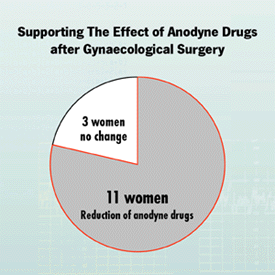Under investigation were 28 women who received a fibromyom surgery on the uterus.
Medical Resonance Therapy Music® Group
14 women were treated with Medical Resonance Therapy Music® 2-3 times before surgery and for twelve days after surgery, 1-2 times per day, each time for 30-60 minutes in addition to a conventional treatment with antibiotics, vitamin preparations, anodynes and a disintoxication therapy as well as a physiotherapy. In difference to the control group these women did not receive sedative drugs before and after surgery.
The treatment with Medical Resonance Therapy Music® brought about a prolonged effect of the narcotic and anodyne drugs in 11 out of 14 women, which led to a clear reduction of these drugs.
Control Group
In this group 14 women received the conventional treatment only, not listening to Medical Resonance Therapy Music®. Before surgery they received sedative drugs and after surgery they received the conventional treatment. Here no reduction of narcotic and anodyne drugs was recorded.
Medical Resonance Therapy Music® Group
14 women were treated with Medical Resonance Therapy Music® 2-3 times before surgery and for twelve days after surgery, 1-2 times per day, each time for 30-60 minutes in addition to a conventional treatment with antibiotics, vitamin preparations, anodynes and a disintoxication therapy as well as a physiotherapy. In difference to the control group these women did not receive sedative drugs before and after surgery.
The treatment with Medical Resonance Therapy Music® brought about a prolonged effect of the narcotic and anodyne drugs in 11 out of 14 women, which led to a clear reduction of these drugs.
Control Group
In this group 14 women received the conventional treatment only, not listening to Medical Resonance Therapy Music®. Before surgery they received sedative drugs and after surgery they received the conventional treatment. Here no reduction of narcotic and anodyne drugs was recorded.
Investigators:
Prof. Dr. med. G. Gerassimowitsch
Prof. Dr. med. Walentina Sidorenko
Dr. med. Anna Kuptschina
Dr. med. Tatjana Teterkina
Dr. med. Sergej Korotkow
